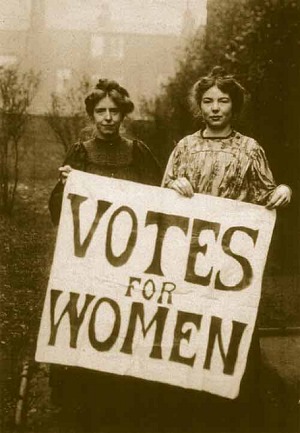At the start of the year I have been pondering the significance of Advent, Christmas and New Year celebrations. There is so much anticipation, busying ourselves with preparation for a couple of dates that rarely live up to the hype of expectation. Having seen shops advertising Christmas since the summer it all comes and goes in a few moments, the tree and decorations down and all packed away until the same time next year.
Then the clock ticks past midnight, fireworks explode to welcome in another hour, another day, another year. For some there is expectation, for others a feeling of isolation and loneliness; “am I the only one not celebrating?” For others it is just another night, another day, another shift, another ordinary.
2018 marks the centenary of women in the UK gaining the right to vote. On 6th February 1918 the ‘Representation of the People Act’ gave women over the age of 30 (and with the right property qualifications) the right to vote. Then on 14th December 1918 the first General Election including female voters took place. Of course this was a significant milestone, though it was a further 10 years until the voting age for women and men became equal.

This got me thinking, where is voting restricted today? Of course there are those states which are none democratic where voting is not an option or part of the culture. Where in my daily living are people excluded from the voting and decision making processes?
One significant element of Baptist ecclesiology (the nature and structure of church) is the church meeting. Baptist churches work a bit like cooperatives; you apply to become a member and if welcomed into membership you have a voice in the decision making process. Usually anyone is welcome to attend the church and to get involved to a greater or lesser extent in the life of the church but it is the members who come together to ‘discern the mind of Christ’ and make decisions together with regards to the local church.
Due to this understanding of the way of being church there are Baptist churches (as well as other denominations) with two tiered membership; women may be members but are not permitted to become deacons or elders (church leaders). I have heard anecdotes from women who have been told they may attend church meetings but should remain silent (I believe this to be historic and less likely to be the case now). I know Baptist Ministers who (in Twenty-First Century Britain) have been told by churches that they would receive a lower stipend (salary) because they have a husband to look after them (needless to say women tend to turn such dismal offers down). Women continue to be treated as second class citizens. This does not apply to all churches but it is disappointing that 100 years after women were given the vote in society the church can remain exclusive.
Then there are those who cannot vote or have a voice in church decision making processes because they are excluded from membership. It is not for a lack of faith or genuine desire to serve Christ and His church but because the Church either overlooks or even rejects those who do not conform. To this day women are excluded but so are those with disabilities, those who are gay or lesbian, all too often those with different educational attainment or who have a different colour skin or a accent to the existing majority of members.
The broken church hopes to offer a bigger table. Not to take away the place of another but to extend the table (or even to break it and build a new one) so that all may have a place and feel welcomed.
